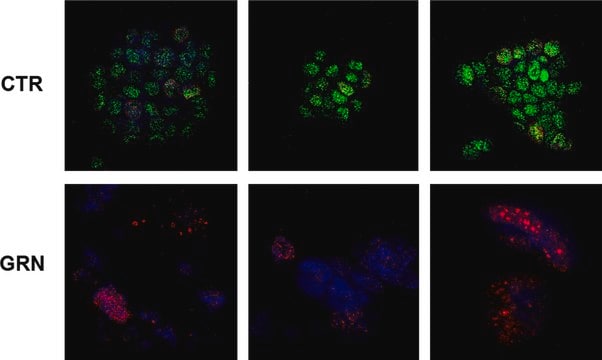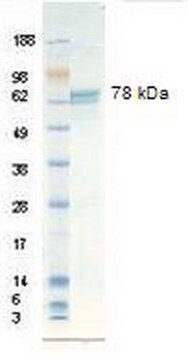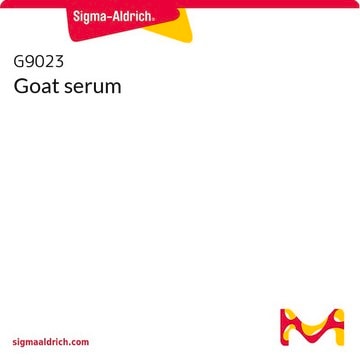07-373
Anti-acetyl-Histone H2B Antibody
Upstate®, from rabbit
Sign Into View Organizational & Contract Pricing
All Photos(1)
About This Item
UNSPSC Code:
12352203
eCl@ss:
32160702
NACRES:
NA.41
Recommended Products
biological source
rabbit
Quality Level
antibody form
purified antibody
antibody product type
primary antibodies
clone
polyclonal
species reactivity
human
manufacturer/tradename
Upstate®
technique(s)
western blot: suitable
isotype
IgG
NCBI accession no.
UniProt accession no.
shipped in
dry ice
target post-translational modification
acetylation (Lys5,Lys12,Lys15,Lys20)
Gene Information
human ... H2BC1(255626)
Specificity
acetylated Histone H2B
Immunogen
Synthetic peptide in which there is an acetyl-lysine at residues 5, 12, 15 and 20 of human Histone H2B
Application
Detect acetyl-Histone H2B also known as Histone H2B with Anti-acetyl-Histone H2B Antibody (Rabbit Polyclonal Antibody), that has been demonstrated to work in WB.
Research Category
Epigenetics & Nuclear Function
Epigenetics & Nuclear Function
Research Sub Category
Histones
Histones
Quality
routinely evaluated by immunoblot in sodium butyrate treated, acid extracted proteins from HeLa cells
Target description
15 kDa
Physical form
0.1M Tris-glycine, pH 7.4, 0.15M NaCl, 0.05% sodium azide before the addition of glycerol to 30%
Format: Purified
Protein A chromatography
Storage and Stability
2 years at -20°C
Legal Information
UPSTATE is a registered trademark of Merck KGaA, Darmstadt, Germany
Disclaimer
Unless otherwise stated in our catalog or other company documentation accompanying the product(s), our products are intended for research use only and are not to be used for any other purpose, which includes but is not limited to, unauthorized commercial uses, in vitro diagnostic uses, ex vivo or in vivo therapeutic uses or any type of consumption or application to humans or animals.
Not finding the right product?
Try our Product Selector Tool.
Storage Class Code
10 - Combustible liquids
WGK
WGK 1
Certificates of Analysis (COA)
Search for Certificates of Analysis (COA) by entering the products Lot/Batch Number. Lot and Batch Numbers can be found on a product’s label following the words ‘Lot’ or ‘Batch’.
Already Own This Product?
Find documentation for the products that you have recently purchased in the Document Library.
Spatial memory consolidation is associated with induction of several lysine-acetyltransferase (histone acetyltransferase) expression levels and H2B/H4 acetylation-dependent transcriptional events in the rat hippocampus.
Bousiges, O; Vasconcelos, AP; Neidl, R; Cosquer, B; Herbeaux, K; Panteleeva, I; Loeffler et al.
Neuropsychopharmacology null
Estelle Schueller et al.
European neuropsychopharmacology : the journal of the European College of Neuropsychopharmacology, 33, 101-116 (2020-02-15)
Memory impairment is the main feature of Alzheimer's disease (AD). Initial impairments originate in the temporal lobe area and propagate throughout the brain in a sequential manner. Epigenetic mechanisms, especially histone acetylation, regulate plasticity and memory processes. These may be
Yixin Dong et al.
Molecular and cellular biology, 37(19) (2017-07-12)
Global histone hyperacetylation is suggested to play a critical role for replacement of histones by transition proteins and protamines to compact the genome during spermiogenesis. However, the underlying mechanisms for hyperacetylation-mediated histone replacement remains poorly understood. Here, we report that
A novel activator of CBP/p300 acetyltransferases promotes neurogenesis and extends memory duration in adult mice.
Chatterjee, S; Mizar, P; Cassel, R; Neidl, R; Selvi, BR; Mohankrishna, DV; Vedamurthy et al.
The Journal of Neuroscience null
Snehajyoti Chatterjee et al.
EMBO molecular medicine, 10(11) (2018-10-03)
Chromatin acetylation, a critical regulator of synaptic plasticity and memory processes, is thought to be altered in neurodegenerative diseases. Here, we demonstrate that spatial memory and plasticity (LTD, dendritic spine formation) deficits can be restored in a mouse model of
Our team of scientists has experience in all areas of research including Life Science, Material Science, Chemical Synthesis, Chromatography, Analytical and many others.
Contact Technical Service








